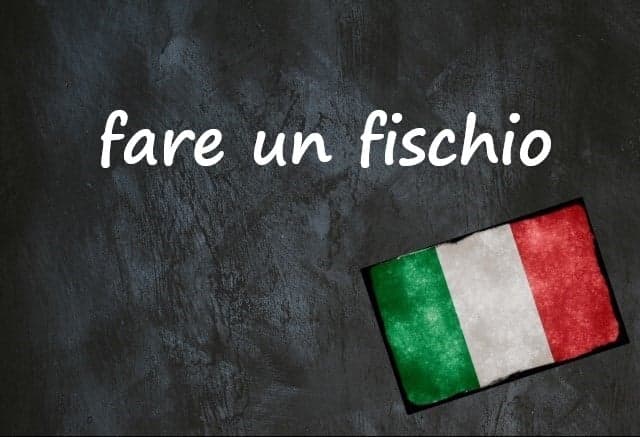Italian expression of the day: ‘Fare un fischio’

Give us a shout once you’ve mastered this expression.
Only rarely do Italian expressions have one single meaning, with most phrases having at least two ‘layers’ of significance, one strictly literal and the other figurative.
That also applies to fare un fischio (hear it pronounced).
Literally translatable as ‘to emit a whistle’, the phrase is used in its original sense in just a handful of contexts, mostly in sports where referees or umpires use whistles to enforce the rules of the game.
But, fare un fischio is a far more popular expression when used figuratively, with a meaning that’s practically equivalent to the British English ‘give me a shout’ or the American English ‘give me a holler’ (or just ‘holler’).
Fammi un fischio se ti serve una mano con qualcosa. Sono in cucina.
Give me a shout if you need a hand with anything. I’ll be in the kitchen.
Vi faccio un fischio quando ho finito di caricare la macchina.
I’ll give you a shout when I’m done loading up the car.
As shown by the above examples, the verb fare must be declined based on the person or people sending out ‘the whistle’. Similarly, the pronoun particle (mi, ci, vi, etc.) placed at the end of the verb fare changes depending on who’s meant to receive the fischio.
Besides ‘to give a shout’, the phrase can also mean ‘to give someone a call’, especially if whoever’s asking you to give them 'a whistle' accompanies the request with the ‘call me’ hand gesture (i.e. by holding a thumb near either ear, with the pinky finger pointed at the mouth).
Arrivo a casa sulle 10. Fammi un fischio a quell’ora.
I’ll be home around 10. Give me a call then.
Finally, fare un fischio can also be used in a sarcastic way to make it known that you don’t think something will ultimately happen or will go according to plan. For instance:
Mi aveva detto che sarebbe venuto.
Si, certo. Fammi un fischio (quando lo vedi)...
He told me he’d come.
Yeah, right. Let me know (when you see him)...
In this case, the second part of the sentence (quando lo vedi in the above example) can usually be omitted and fare un fischio can stand alone as the sarcastic tone of the statement is generally clear even without it being complete.
Do you have an Italian phrase you'd like us to feature? If so, please email us with your suggestion.
Did you know you can get all our Italian words and expressions of the day on our new app as soon as we publish them? It takes a few seconds to download the app at the Apple or Android store, then you can select "Italian Word of the Day" in your Notification options via the "User" button.
Comments
See Also
Only rarely do Italian expressions have one single meaning, with most phrases having at least two ‘layers’ of significance, one strictly literal and the other figurative.
That also applies to fare un fischio (hear it pronounced).
Literally translatable as ‘to emit a whistle’, the phrase is used in its original sense in just a handful of contexts, mostly in sports where referees or umpires use whistles to enforce the rules of the game.
But, fare un fischio is a far more popular expression when used figuratively, with a meaning that’s practically equivalent to the British English ‘give me a shout’ or the American English ‘give me a holler’ (or just ‘holler’).
Fammi un fischio se ti serve una mano con qualcosa. Sono in cucina.
Give me a shout if you need a hand with anything. I’ll be in the kitchen.
Vi faccio un fischio quando ho finito di caricare la macchina.
I’ll give you a shout when I’m done loading up the car.
As shown by the above examples, the verb fare must be declined based on the person or people sending out ‘the whistle’. Similarly, the pronoun particle (mi, ci, vi, etc.) placed at the end of the verb fare changes depending on who’s meant to receive the fischio.
Besides ‘to give a shout’, the phrase can also mean ‘to give someone a call’, especially if whoever’s asking you to give them 'a whistle' accompanies the request with the ‘call me’ hand gesture (i.e. by holding a thumb near either ear, with the pinky finger pointed at the mouth).
Arrivo a casa sulle 10. Fammi un fischio a quell’ora.
I’ll be home around 10. Give me a call then.
Finally, fare un fischio can also be used in a sarcastic way to make it known that you don’t think something will ultimately happen or will go according to plan. For instance:
Mi aveva detto che sarebbe venuto.
Si, certo. Fammi un fischio (quando lo vedi)...
He told me he’d come.
Yeah, right. Let me know (when you see him)...
In this case, the second part of the sentence (quando lo vedi in the above example) can usually be omitted and fare un fischio can stand alone as the sarcastic tone of the statement is generally clear even without it being complete.
Do you have an Italian phrase you'd like us to feature? If so, please email us with your suggestion.
Did you know you can get all our Italian words and expressions of the day on our new app as soon as we publish them? It takes a few seconds to download the app at the Apple or Android store, then you can select "Italian Word of the Day" in your Notification options via the "User" button.

Join the conversation in our comments section below. Share your own views and experience and if you have a question or suggestion for our journalists then email us at [email protected].
Please keep comments civil, constructive and on topic – and make sure to read our terms of use before getting involved.
Please log in here to leave a comment.